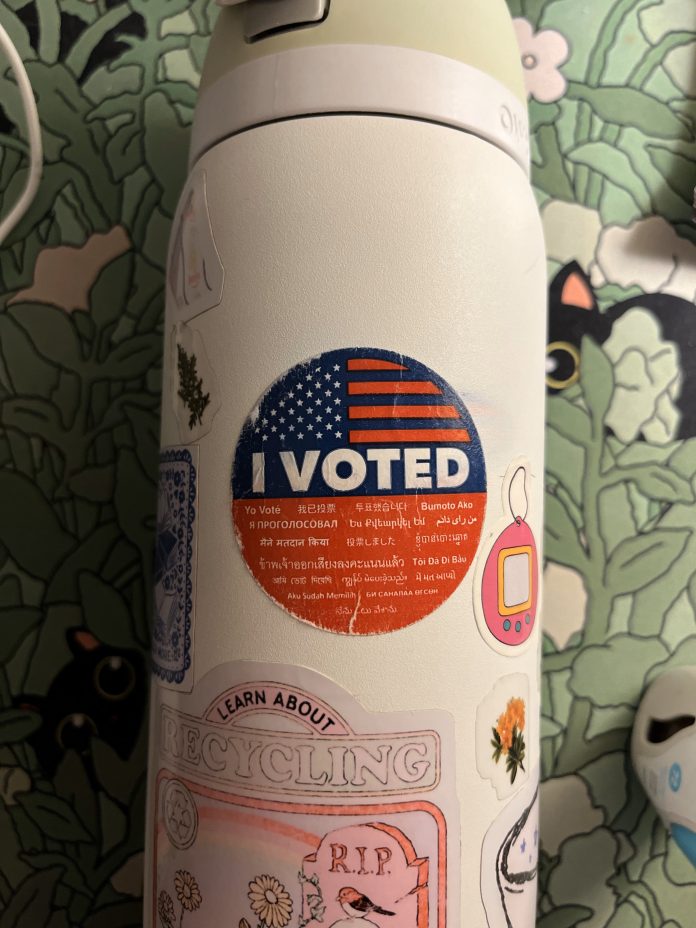Milan Dosanjh
Contributing Writer
The aftermath of the 2024 presidential election invited a strong shift of energy on campus. Many students are still processing the results, as this was a crucial election cycle responsible for factors such as our economy, healthcare, and right to bodily autonomy. On election day, Nov. 5, many students exercised their civic duty by casting their votes. For many, it was their first time voting in a presidential election. UC Santa Barbara is home to many students of different backgrounds, cultures, and demographics. A particular emphasis on their voices during this time is crucial for understanding how we as a collective are processing the election outcome within the past few weeks.
In an interview with The Bottom Line (TBL), Melina Ledwith, a third-year studying microbiology, spoke about her opinions on the election. “It made me very sad because I know that there are a lot of people in my life that I care about, and I know that they’ll be affected these next four years,” Ledwith said, cementing the fact that the outcome of the election is not only a personal dilemma, but a universal circumstance. No matter how we may have felt about the election, we reconnected with our loved ones because fostering a sense of togetherness in times of extreme change helps ground us. “I didn’t think of how I was to be affected. I thought about everyone else.” For many of us, including Ledwith, we are drawn towards how the outcome will affect our peers.
Women are an increasingly at-risk demographic, especially while policies of abortion and bodily autonomy are actively being threatened by the Trump administration. “Women’s reproductive health care is a very important topic right now, and I think it’s something that greatly affects college students,” Ledwith told TBL regarding her concerns for female reproductive rights.
Many other students also resonated with feelings of shock and displacement. Dylan Steil, a third-year studying cell and developmental biology affirmed.“I was absolutely disappointed by the outcome.” Steil echoed Ledwith’s concern on how other communities will be affected following the election. “There are many LGBTQ+ students that are going to have trouble living here and receiving access to certain things.” Steil said, setting himself aside and viewing the rippling effects as hazardous obstacles for marginalized people in our country.
Another issue we cannot overlook is the climate crisis and the ever-increasing toll on the environment that is being neglected by the Trump administration. Cristela Cohen, a second-year studying environmental science, elaborates upon this concern by providing insight into how the results of this election will heavily impact the future sustainability of life on Earth. “We overlook the climate crisis regularly in our society, and with the new administration being sworn into office, it just makes matters so much worse.” Cohen stresses that understanding and educating ourselves on the environment is just as important as advocating for the right to autonomy. With the health of our planet depreciating each passing year, it is clear that we must take responsibility and act. “The new administration really doesn’t prioritize our climate. That’s what’s so concerning,” Cohen added.
After a litany of opinions regarding the outcome of this election, we may feel demoralized and completely stumped over what to do now. The question of, “how can we create change?” became prevalent among many students. Instead of facing the finalized results with melancholy, many students faced it with courage and a newfound desire for activism. “I will absolutely engage in future civic activity. I feel so much less passive now despite the way that I was treating the elections. I wasn’t doing anything, and for the next cycle I want to get more involved. Anything from going door-to-door and supporting the candidate.” said Steil. These interviews revealed a commitment to education and advocacy within the political system, highlighting how students like Steil are driving efforts to shape a future where they can pioneer change for America. “It’s definitely made me think that I need to get more involved in politics. And maybe try and help with campaigns in the future.” Ledwith commented.
“Next time I will do my part. I want to play a bigger part, create more of an impact.” expressed Steil. We may be faced with outcomes that we, unfortunately, cannot change, but the most progressive action to take is to become more educated, prepared, and ready to vote. We are a community that turns to each other in moments of disarray and asks the question: “What’s next?”

















